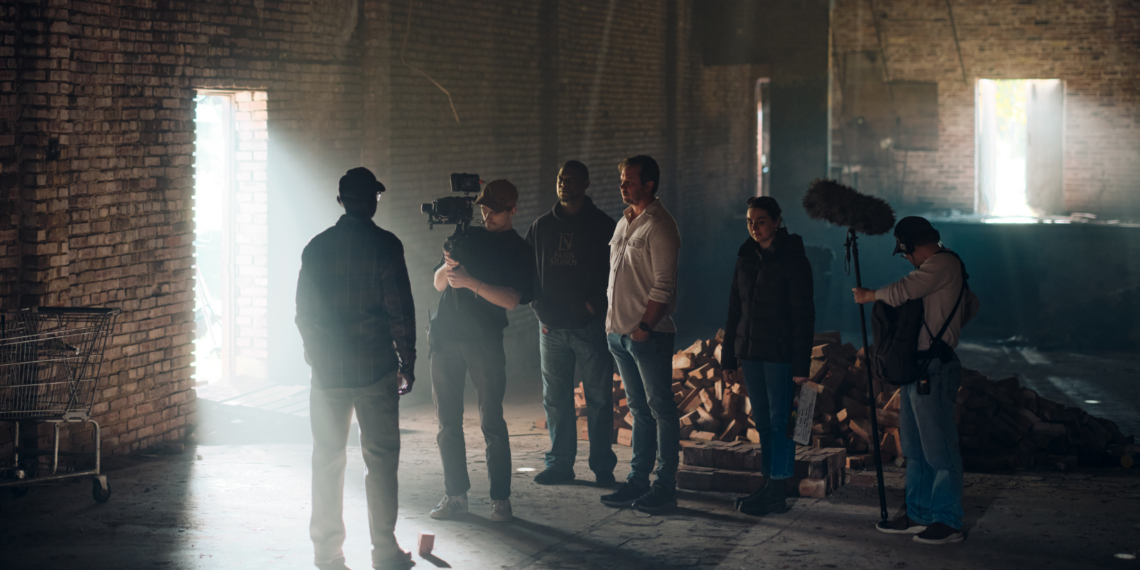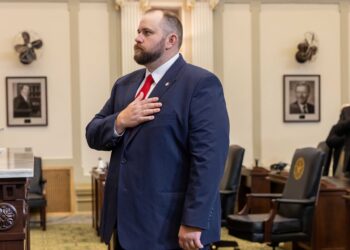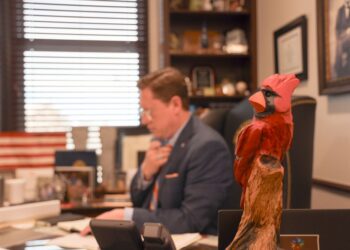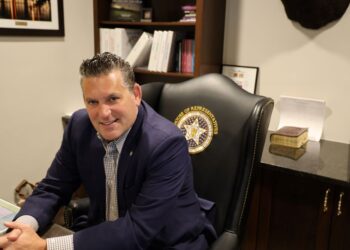OKLAHOMA CITY (OBV) – Prairie Surf Media, Oklahoma’s go-to studio for film and television show productions, is diving into the creative side of the entertainment industry with a new division called Prairie Surf Creative, which is producing documentaries that tell important Oklahoma stories, as well as videos that publicize companies and establishments across the state.
Prairie Surf Creative is off and running with three documentaries in the works.
The first documentary is The Jewel, which looks at the history of Northeast Oklahoma City’s beloved Jewel Theatre and the ongoing effort to restore it from a state of disrepair. The Jewel is located at 904 NE 4th St. It is the last vestige of a once thriving Black business district on that street. It was in business form the 1930s to 1970s, providing entertainment to Black residents who endured race-based restrictions mandated by Jim Crow laws. The Jewel still stands, and its charming, unique look is still an eye-catcher, but the interior structure is in rough shape and in dire need of repair. A fundraising effort is underway to restore The Jewel’s structure and revive it as a theater and performing arts center.
“Originally, this started as a way that we could make a fundraising video to help them raise money to potentially preserve the theater. And then we sort of learned about the history – not only the history of the theater, but the history of disuse – and we decided that this has to be more than just a fundraising documentary, this has to be a film,” said Matt Payne, co-founder and co-CEO of Prairie Surf Media. “We’ve been producing it over the last year and have interviewed a lot of key leaders in Northeast Oklahoma City, and along the way, the building got an Andrew W. Mellon Foundation grant, which is really exciting. So, they’re still working on fundraising, but the structure of the building is on its way to being preserved. So, that’s an amazing project for us.”
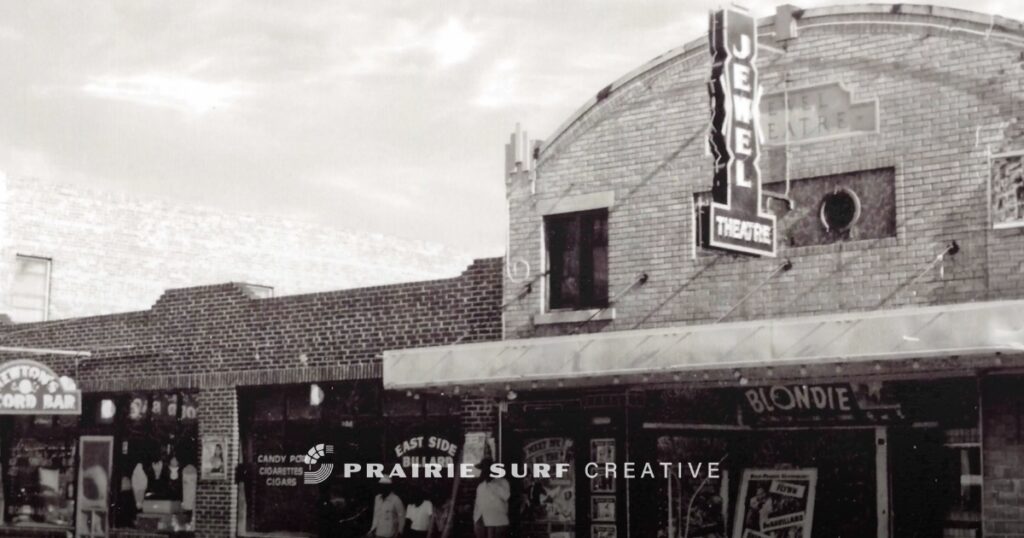
The documentary also explores Black culture and its dynamic creative talents during the pre-integration years when the Jewel Theatre was a popular destination. It also takes a look at the new prosperity in Northeast Oklahoma, as well as the Film Education Institute of Oklahoma’s film program at Douglas High School, which Prairie Surf participates in, Payne said.
“What better way to keep kids inspired about making movies than saying, ‘Here is a theater in your own community where you can premiere your films,'” Payne said.
A trailer for The Jewel has been released. The documentary is expected to released in 2024, in time to be shown at film festivals, according to Payne.
Go to the Prairie Surf Creative website to watch the trailer.
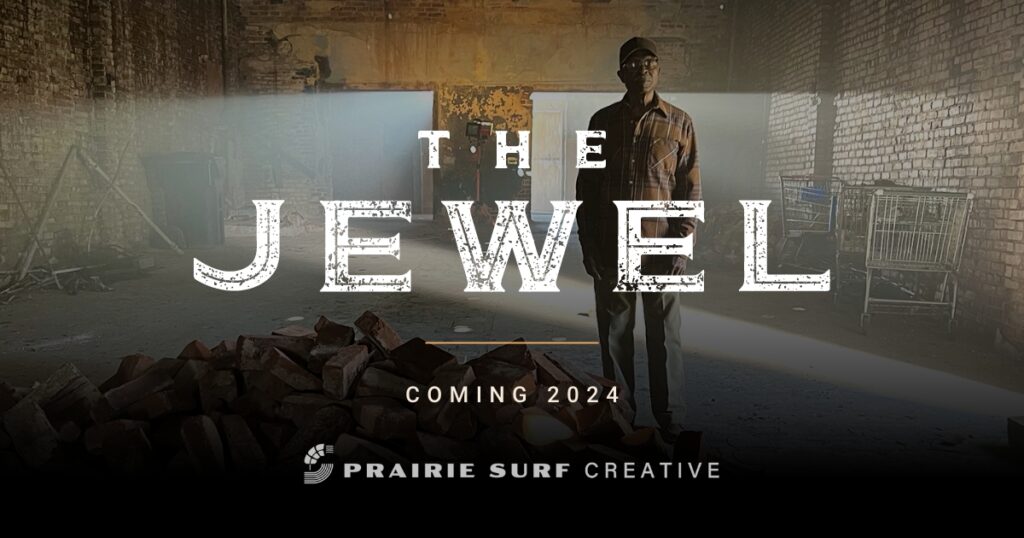
Prairie Surf Creative is also in post-production on a documentary about Robert Wilson, a lead researcher for the Manhattan Project who focused on particle accelerator research.
“Ultimately, he was a pacifist and was sort of led into the war, and then, after the Trinity tests and the [atomic] bombs on Nagasaki and Hiroshima, he had tremendous guilt. He dedicated the rest of his life to the peaceful use of this technology,” Payne said.
Wilson’s work beyond the Manhattan Project includes applying the proton technology toward cancer treatments.
Prairie Surf Creative’s third documentary recently went into production. It celebrates the life of legendary Oklahoma Civil Rights pioneer, teacher and civics leader, Clara Luper.
Luper was the advisor for the Oklahoma City National Association for the Advancement of Colored People (NAACP) Youth Council in 1957. The Youth Council staged a sit-in at Oklahoma City’s Katz drugstore on Aug. 19, 1958. They walked into the store, ordered Cokes and, following Luper’s guidance, demonstrated their discontent with segregation, thus launching the nation’s sit-in movement, according to the Oklahoma Historical Society’s website.
The Youth Council conducted sit-ins throughout the early 1960s, helping to end segregation in public establishments across Oklahoma. Luper championed nonviolent defiance to institutional racism and Jim Crow laws by participating in marches and demonstrations, and was often jailed for her Civil Rights efforts.
The documentary will focus on the time period from when Luper took her students to the NAACP Awards up to the integration of Katz, and will include interviews with participants of the sit-in, including Luper’s daughter, Marilyn Luper Hildreth.
The Clara Luper documentary came about after Prairie Surf was hired by the Oklahoma City Philharmonic to create a video celebrating Luper’s life in honor of her 100th birthday, for which a tribute concert was to be held. Several Oklahoma luminaries, including former governors Frank Keating and Brad Henry, actress Kristin Chenoweth, country music singer Reba McEntire and Oklahoma City Public Schools officials participated in the video.
“Each person said, ‘Because you sat, I stand for diversity,’ ‘Because you sat, I stand for education,’ ‘Because you sat, I stand for opportunity.’ And we strung them all together, and it’s this really, really powerful video,” Payne said.
The video premiered at the concert honoring Luper. During the process, Payne got to know Hildreth and former U.S. representative Kendra Horn.
“We talked about the story of Clara Luper and how it’s not fully recognized as the beginning of the sit-in movement by The Smithsonian. We talked about how we could make sure that Clara Luper’s history is told correctly, and [we decided] the first step in that needs to be a documentary film,” Payne said.
A 65th anniversary celebration of the sit-in movement called Freedom Fiesta was approaching when the idea for the documentary came up. The event presented an opportunity to get rolling on the documentary.
“We knew there were going to be a lot of the original sit-in participants that were going to be in town for the celebration. So, we set up a day and we filmed and interviewed several people,” Payne said. “That’s the origin story of that project – it started as a work-for-hire project with the Philharmonic that turned into a tribute video that turned into a documentary.”
The Jewel will likely be a short documentary, and the Clara Luper and Robert Wilson documentaries will be feature-length.
“We hope to have them done by the end of the year, and we’ll hit the festival circuit in 2024,” Payne said.
The long-term goal for Prairie Surf was to move into the entertainment side of movie and television production, Payne said.
Prairie Surf’s creative efforts also include work-for-hire video projects.
“We’re working with the Western Heritage Museum to produce a lot of their in-house content, which includes many documentaries about the origin of the cowboys. We’re working with Allied Arts, producing content for them. We’re producing content for the Oklahoma City Philharmonic. We’re producing content for people all over the city in a work-for-hire capacity,” Payne said.
Prairie Surf Media made a name for itself through its studio setup, Prairie Surf Studios, a 1.3 million square-foot facility that has five soundstages – two 32,000 feet, one 25,000 feet and the remaining two 24,500 feet – each retrofitted to support major film and television show productions.
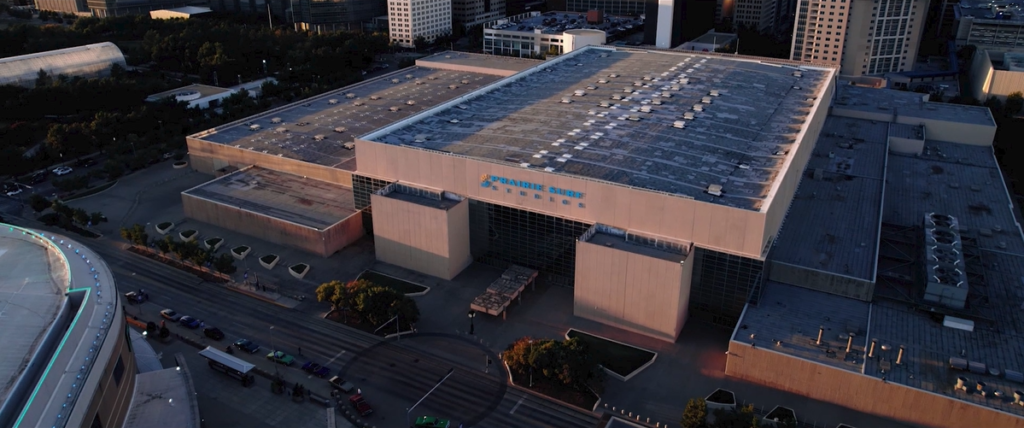
The studio is the former location of the Myriad Convention Center, which opened in 1999 and later became known as the Cox Convention Center. The convention center was leased to Prairie Surf Media and converted into the studio after the Oklahoma City Convention Center opened, thanks to the city’s MAPS 3 funding initiative. Over 100,000 square feet of new space was added during the conversion.
Payne, founded Prairie Surf with Rachel Cannon, an Oklahoma native who got her start in the entertainment industry as an actress, appearing in several hit television shows, including “Big Bang Theory,” “Two and a Half Men” and “Mad Men.” She went on to a six-year stint as a series regular on the popular ABC comedy, “Fresh Off the Boat,” playing recurring character Deidre.
Payne, also an Oklahoman, made his bones in Hollywood as a screenwriter, achieving success as a writer on TV shows “Vegas,” “Memphis Beat,” “The Defenders” and “Without a Trace.” He returned to Oklahoma in 2015 and has since played a prominent role in the state’s film community, producing documentaries for Griffin Communications and the OETA Foundation and teaching film business and screenwriting at Oklahoma City University.
“She does all the L.A.-based business development and I do the Oklahoma stuff,” Payne said.
Film and television production has grown significantly in Oklahoma in recent years. In addition to “Tulsa King,” the hit FX television show “Reservation Dogs” is shot in the Sooner State, specifically in Okmulgee. Upcoming feature film “Killers of the Flower Moon,” directed by legendary filmmaker Martin Scorsese and starring Leonardo DiCaprio, Robert De Niro and Brendan Fraser, filmed in several locations across Oklahoma, including Bartlesville, Fairfax, Osage County, Pawhuska and Tulsa.
The growth is obvious, according to Oklahoma Film & Music Office charts that provide fiscal year breakdowns of the number people hired for film and television productions in the state, the amount of money spent in the state by those productions and the wages paid out by the productions.
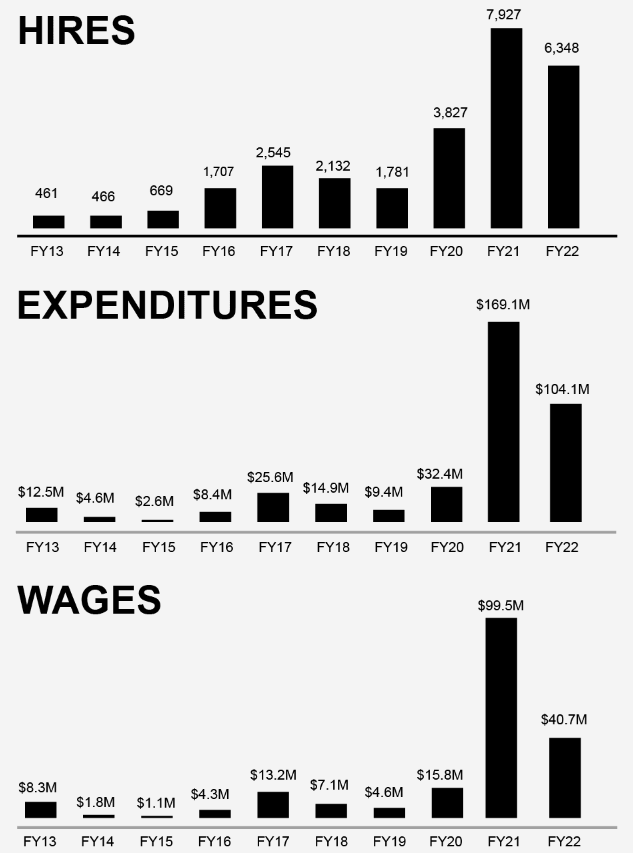
Jeanette Stanton, director of the Film & Music Office, said film production expenditures and wages in Oklahoma sharply declined from FY21 to FY22 because “Killers of the Flower Moon,” the largest film production in the state’s history, was produced during FY21.
Film production impact numbers for FY23 are expected to stay somewhat consistent with FY22 numbers, Stanton said.
“However, looking into our current FY24, there could be more notable changes between those fiscal years due to legislative changes, the type of projects we’ve had during this time and the SAG/WGA strike,” she said.
Although Prairie Surf is thriving as a destination for major Hollywood film and television productions, its heartbeat is in telling the small, personal stories that illuminate sacred parts of Oklahoma’s history.
Prairie Surf will continue to pursue the high-dollar Hollywood productions while not overlooking opportunities to produce more intimate tales.
“Let’s bring big productions here so we can do things like [these documentaries] and tell really impactful Oklahoma stories,” Payne said.









